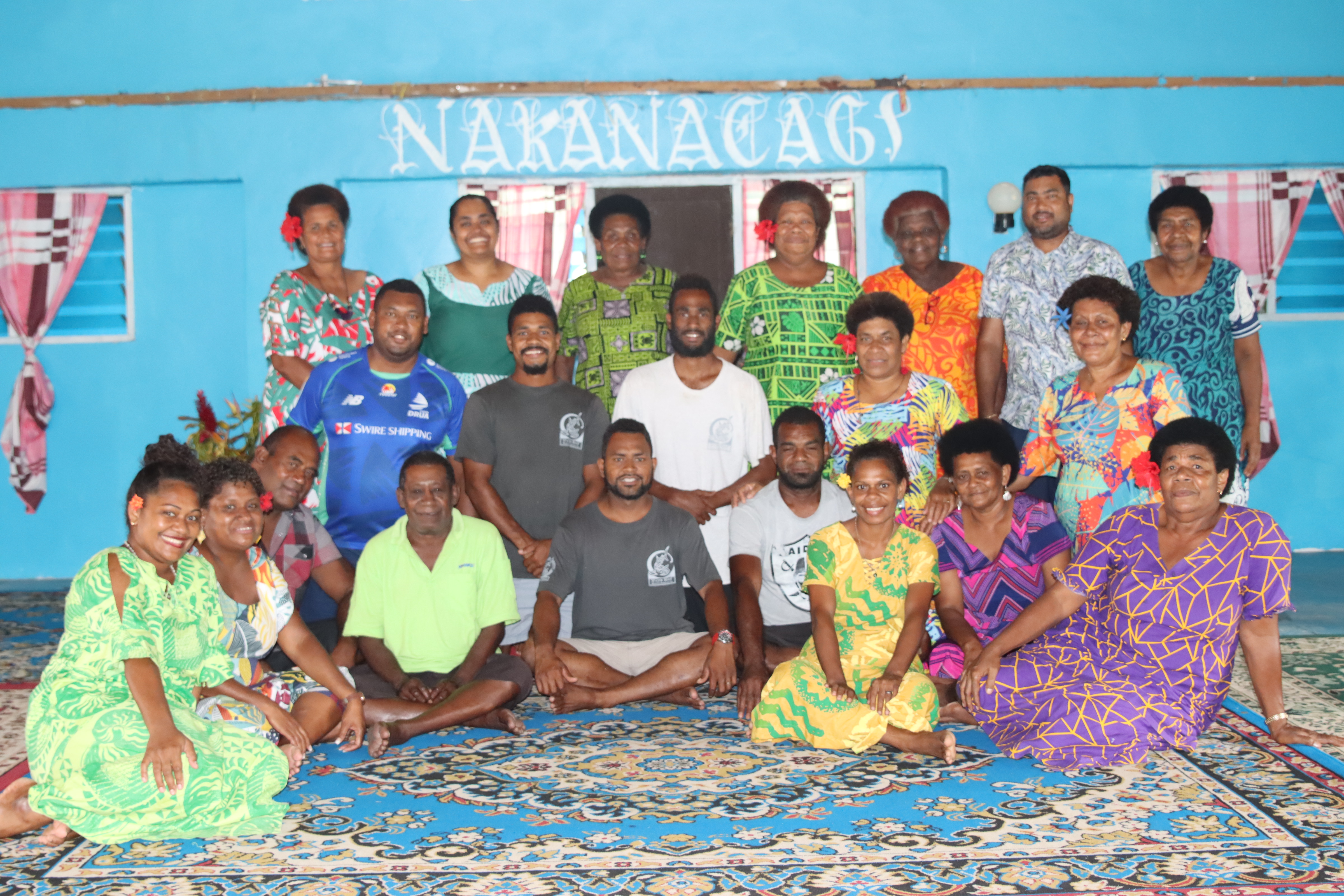Fish Warden Training in Galoa Enhances Protection of Fishing Grounds
February 9, 2024

Jacqueline Nalomaca (standing 2nd from left) with training participants and the Galoa Village Women’s group who were also present in support of the initiative.
Galoa, Fiji - Members of Galoa Village in Serua recently completed a comprehensive two-day fish warden training program. The program equipped 10 people with the skills and knowledge necessary to effectively manage and safeguard their fishing grounds, including the renowned Shark Reef Marine Reserve (SRMR) – one of Fiji's four gazetted marine protected areas.
Conducted by the Ministry of Fisheries, the training covered a range of topics, including awareness of the Fisheries Management Act, emphasizing the pivotal role fish wardens play in enforcing regulations and combating illegal fishing activities within their designated areas.
Jacqueline Nalomaca, an officer from the Compliance Unit of Inshore Fisheries Management Division, stressed the importance of ensuring that wardens are fully informed about their duties, powers, and the proper execution of their responsibilities to ensure successful enforcement efforts.
The trainees also included staff from who routinely encounter poachers on the Shark Reef Marine Reserve during commercial and coral and shark dive trips. Staff members of Beqa Adventure Divers have been working in partnership with Fisheries Officers to conduct enforcement patrols for many years.
Beqa Adventure Divers has sponsored 4 previous Fish Warden Training Courses and trained over 100 individuals from local communities and Villages, in addition to their own staff. They continue to train new staff members so that they are all empowered to enforce the law protecting the Shark Reef Marine Reserve.
The Fish Warden training initiative not only enhances monitoring efforts within the Shark Reef Marine Reserve but also strengthens the protection of the Galoa's fishing grounds, as highlighted by Adre Tabuivalu, the village head or Turaga ni Koro. Tabuivalu emphasized the significance of this training in combating common issues like illegal fishing and diving, thereby safeguarding both the village's livelihood and marine resources.
Beqa Adventures Divers supports Galoa Village through a partnership agreement, which underscores the importance of protecting the fishing grounds and marine reserve, which provide essential habitats for numerous species and contribute to the overall health of local ecosystems.
The training was made possible through collaborative effort involving BAD, the new Fiji Shark Lab, Ministry of Fisheries, Village of Galoa, and UNDP. It also falls under the Investing in Coral Reefs and Blue Economy project, supported by the Global Fund for Coral Reefs and Joint Sustainable Development Goal Fund.
Natasha D. Marosi, Director of Conservation for Beqa Adventures Divers, and founder of the Fiji Shark Lab emphasized the critical role of the partnership between Beqa Adventures Divers and Galoa Village: “This training marks the beginning of our joint journey to protect our precious marine resources. For many years now the Shark Reef Marine Reserve has functioned as a fish bank. When the SRMR is saturated with fish, the spillover substantially increases the fishing yields in the neighboring unprotected reefs of the Village of Galoa. For this to continue to be possible and for marine biodiversity to thrive, the Reserve must be regularly patrolled and enforced.
“Our partnership and the training of Fish Wardens is crucial to the protection of the Galoa village’s fishing grounds and the Shark Reef Marine Reserve. Eight unique species of sharks utilize the Reserve, some call it home and others pass through for hunting, resting, mating and socialization,” Ms. Marosi continued.
She added that the “Shark Reef can be considered a critical marine space in this regard in that many marine species, including protected and vulnerable ones reside on the Reserve. The Reserve provides a safe space for the populations of these vulnerable and protected species to recover from intense fishing pressure and other detrimental environmental impacts.”
Upon completion of the training, participants receive a Warrant Card signed by the Minister of Fisheries, granting them legal authority as enforcers of the Fisheries Act, further strengthening their capacity to protect marine ecosystems and ensure the sustainable use of ocean-based resources.
For further media enquiries please contact:
Risiate Biudole, Communications Analyst, UNDP Pacific Office in Fiji. (E) risiate.biudole@undp.org

 Locations
Locations



